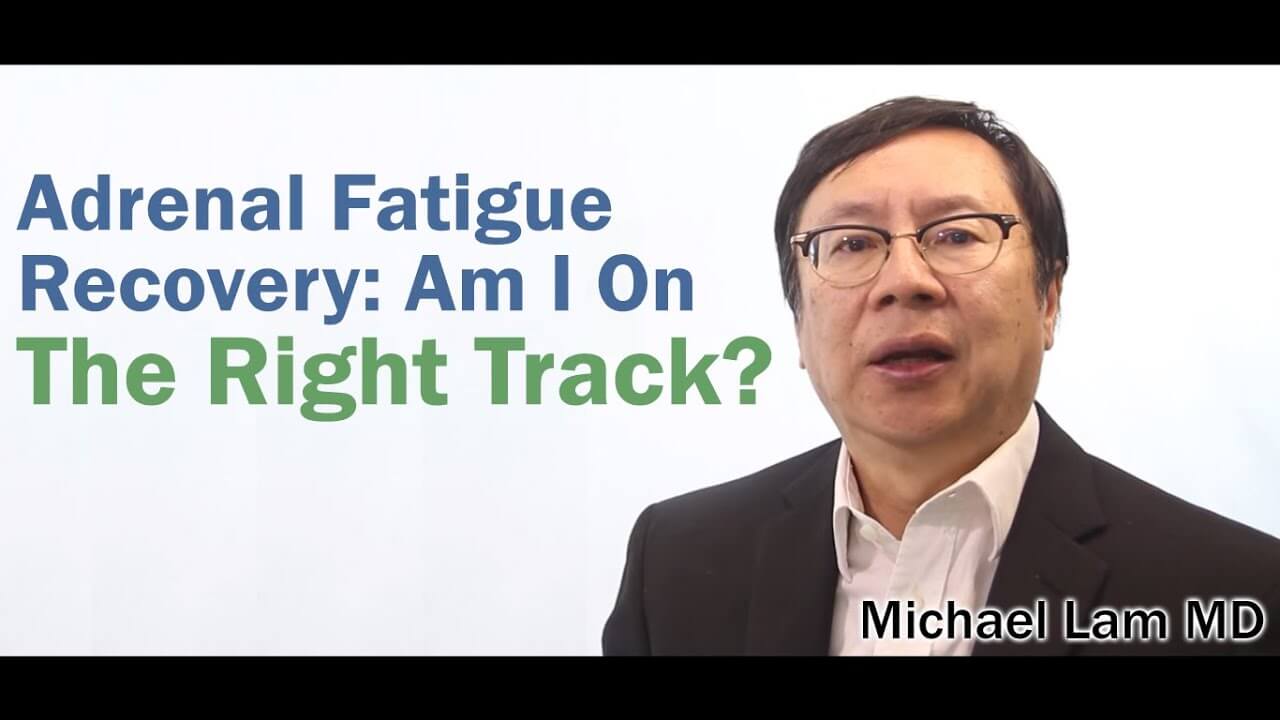
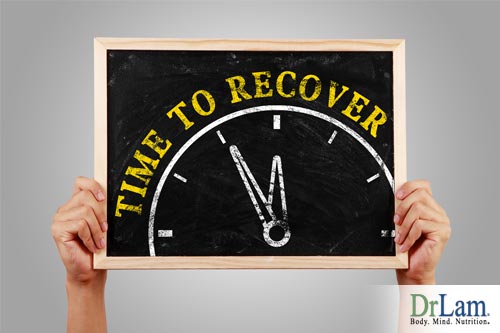 The speed of Adrenal Fatigue recovery varies greatly from person to person. Under expert guidance, the process normally takes a few weeks in mild cases to a few months in moderate cases. In severe cases, it may take a year or more.
The speed of Adrenal Fatigue recovery varies greatly from person to person. Under expert guidance, the process normally takes a few weeks in mild cases to a few months in moderate cases. In severe cases, it may take a year or more.
Many people question whether a total and complete Adrenal Fatigue recovery is possible. The answer is yes in the vast majority of cases, but only if done right. Adrenal Fatigue Syndrome often takes a decade or more to develop. It is important to allow the body time to recover. A few months of recovery is considered a short time within this time horizon. Time is a great healer when the body is given the proper nutrients along with proper lifestyle and dietary protocols. Those who demand a quick Adrenal Fatigue recovery invariably become disappointed because the body is not a light switch that can be turned on and off at will. A systematic and logical approach works the best under professional guidance.
The adrenal fatigue recovery curve is a graphical representation of how the body recovers on the vertical axis plotted against time on the horizontal axis. A good recovery curve usually consists of multiple mini-cycles. Each cycle has three sequential periods, resembling an "S" curve, that each lasts between one and six months.
A successful adrenal fatigue recovery plan consists of multiple "S" curves in an upward sustained series without any major downward crashes. Over time, this will resemble a series of stair-steps upwards, as illustrated in the graph below.
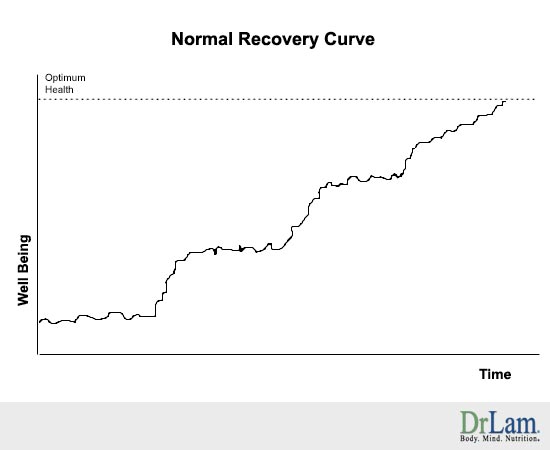
Let us look at this cycle in more detail. The overall adrenal fatigue recovery curve is composed of multiple mini-cycles. Each mini-cycle consists of three periods.
This period normally lasts from 1 day to 6 weeks, depending on the stage of adrenal fatigue. The stronger the adrenal function, the shorter the duration. During this time, the body may not experience any significant changes even though nutrients have been administered. One continues to feel fatigued. This is the period where the body builds its lost reserve and strengthens internally. It is not uncommon to feel even worse from time to time.
This period may also see paradoxical reactions arise. Adjusting nutrients may be needed. The body may be in a process of resetting itself internally.
Supporting the body may involve increasing or decreasing the dose of nutrients, depending on the body type and sensitivity level. Strategies that do not allow the body to go through this important preparation stage often fail over time. This is due to the body’s lack of reserves needed to cushion itself against the stress experienced during this stage of the recovery period. Small dips within the adrenal fatigue recovery cycle will then occur. It is like forcing an athlete to run a sprint without adequate warm-up.
This period usually follows immediately after the preparation period. It can last a few days to 12 weeks if the preparation period is carried out properly. Again, the duration of this period highly depends on the stage of adrenal fatigue. Generally speaking, the earlier the adrenal fatigue stage, the longer this period can last. The weaker the adrenals, the more tendency for this period to be short-lived unless under professional guidance.
During this time the body is able to handle stress better. Fatigue reduces, palpitations frequently dissipate, and anxiety attacks diminish. Blood pressure starts to stabilize, brain fog starts to dissipate, and functional sleep returns. There might be mini-crashes and setbacks from time to time that last a few days. They are more tolerable compared to before, and recovery is faster. There is an overall sense of well-being as if a burden has been lifted from one's shoulder. An overall sense of optimism returns. Those having frequent infections will find that recovery is faster, and the frequency of infection is reduced.
By the end of this period, many troublesome symptoms should have greatly reduced. There should be sustained energy to carry out normal daily activities and social activities. If there is concurrent thyroid illness, many will note the returning thyroid function and that they require less medication. Female hormone imbalance symptoms associated with PMS may improve and menstrual cycles may become more regular.
At this point, the body has stabilized. There is no set time frame for the duration of this period. Generally, it lasts a few weeks to a few months. In the early stages of adrenal fatigue, this period can go on for years and is totally asymptomatic. In the later stages of adrenal fatigue, you may have to cope with long-term symptoms. Sufferers have to slowly adapt to an overall lower level of energy function. Over time, they have forgotten what optimum health feels like and often give up. This is especially the case if adrenal function during this plateau phase drops below the adrenal symptoms threshold level and they constantly suffer. In other words, here "you learn to live with what you have,” even though you are not comfortable.
If the adrenal function is already at its maximum, one can be stuck at this period for a very long time without upward progress. Many on self-guided programs are not able to rise to the next cycle due to a lack of planning. This is perhaps the most trying time, as impatience sets in. Most interpret the lack of continuity and sustained improvement as a failure and become disappointed. Thus, additional stress can be put on the adrenals unknowingly.
Others might start to take more nutrients, thinking that doing so will help speed up the process and force the adrenals to work harder at a time when they are not capable of doing so. Forcing the body to accelerate instead of allowing it time to rebuild itself is a grave mistake. It could lead to unexpected and severe crashes.
An experienced clinician will use this time smartly to allow the body to rest, yet slowly transition the body using proper nutrients to get ready to go to the next stage of the full adrenal fatigue recovery program. It is unfortunate that this phase is usually followed by another crash for most people unless the condition is professionally managed by an experienced clinician. This is especially true in advanced cases of adrenal fatigue (stages 3 and 4).
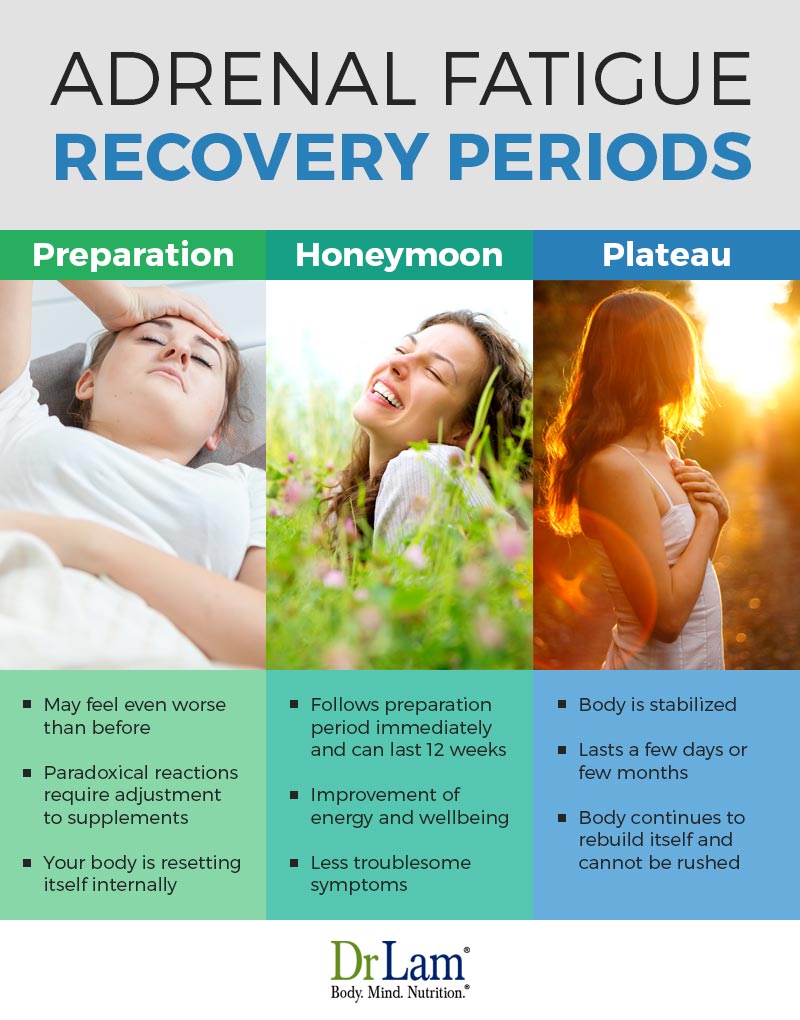
As a person goes through multiple successful mini-cycles without major setbacks, the overall sense of well-being gets better with each cycle. Though the most dramatic improvement often comes in the first few cycles, one accumulates more energy with time, and fatigue becomes less pronounced.
Setbacks between the cycles often become less severe than those experienced with previous crashes. One experiences a higher high and a higher low in terms of well-being with time. This is recovery at its best. The body is allowed to rest after each upward movement. It has time to build up a reserve before ascending again. This reserve building time is critical. Proper nutrients administered here strengthen the adrenals and cushions the mini-crashes and setbacks so frequently experienced by all. Having enough in reserve allows the body to continue its rebuilding process on a sustained basis while withstanding insults from daily life.
Most people have a mistaken belief that the hallmark of a successful adrenal fatigue recovery program has an early onset of increased energy and fatigue removal. They expect this to be sustained on a linear basis uninterrupted in an upward trend line. This ideal situation only occurs in a minority of cases where the fatigue is very mild and under expert guidance. For most cases, due to internal derangement of the adrenals, the road to recovery is laden with potholes and crashes.
Most self-guided programs achieve success in ascending the first cycle. Those who take stimulatory nutrients often experience an initial sense of well-being, followed by a prolonged plateau that is unable to ascend further. We call this "hitting the wall". Regardless of what nutrients are given, the body fails to gain more energy. Fatigue continues, as illustrated in the graph below in line A
In time, the body starts to decompensate, and with a stressful event, a crash is triggered. The adrenal fatigue recovery process takes a few steps backward. The body returns to a functional state worse than before. It then stabilizes for a while but is unable to regain its composure. An extraordinary effort is needed to gain a small incremental sense of well-being. With each succeeding bout of stress, the body decompensates further.
Stressors can be physical such as excessive exercise, emotional such as mental strain, or nutritional such as taking more nutrients that are thought to be good but cannot be processed or assimilated. The overall recovery curve resembles that of a stair step going down, with lower lows and lower highs as illustrated in line B.
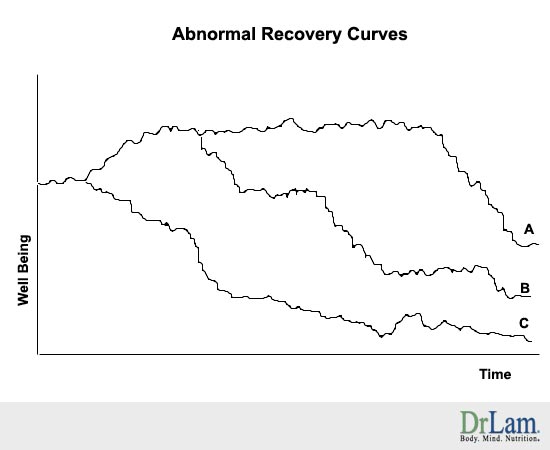
Those whose bodies are constitutionally sensitive may not even experience the initial onset of energy. They crash right from the beginning and never fully recover from it, as illustrated in line C.
Fortunately, you can do much to aid in your recovery and even reverse adrenal fatigue. Do note, however, that recovery may take weeks, months, or sometimes even years depending on the stage of adrenal fatigue and your general state of health.
We each have different stressors. For many, these stressors are psychological. We may suffer from anxiety, for example, due to our home life or work situation. Many of us suffer from stress derived from exposure to toxins. For others, our stress results from the foods we do or do not eat.
Identifying our stressors and doing something about them is one of the first steps we need to take on the path of adrenal fatigue recovery.
A diet specifically designed to reverse adrenal fatigue such as the adrenal fatigue diet focuses on brightly colored vegetables, lean protein sources, and the judicious use of carbohydrates. Interestingly, a diet without any carbohydrates can increase the adrenal load and worsen adrenal fatigue.
A good rule of thumb to follow when eating to reverse adrenal fatigue is to include organic leafy green vegetables as well as a variety of orange and purple vegetables. These vegetables are an excellent source of antioxidants, vitamins, minerals, and fiber. All of these promote adrenal health.
With regards to your carbohydrate intake, complex carbohydrates like whole grains are an excellent choice.
Protein choices should ideally consist of organic lean red meat, fish, and chicken or turkey. Turkey, for example, contains tryptophan, an amino acid that helps manage cortisol levels and helps you relax.
Healthy fat choices to incorporate include seeds and avocado.
These foods tend to convert to glucose at various rates, thereby promoting a steady source of energy and balanced blood sugar levels over a longer period.
Leafy greens, nuts, and legumes are also a rich source of magnesium which helps maintain a metabolic balance and boosts your energy levels. In so doing, they may help combat fatigue, one of the most common symptoms of adrenal fatigue.
In addition to what you eat, when you eat is important. Eating regular meals throughout the day helps ensure your body receives a steady supply of the nutrients it needs.
Regular meals may also promote blood sugar balance and thus help manage excess cortisol levels. Skipping meals, in contrast, may lead to spikes and crashes in blood sugar that add to your adrenal stress and thus worsen adrenal fatigue.
When eating, make sure to eat small but balanced meals. And take the time to enjoy them. Rushing meals could contribute to gastric issues. So, chew your food slowly and enjoy the taste sensation.
To reverse adrenal fatigue, there are also certain foods and beverages you should avoid. Caffeine and sugar, for example, may promote your body’s inflammatory response. As stimulants, they may increase your energy levels for a short while, only to be followed by a slump. So, if you have to have a cup of coffee in the morning to help you start your day, limit it to one if possible. If you take sugar with your coffee, cut the sugar down or leave it out entirely. If you have a sweet tooth, opt for fruit instead of sugary foods. Also, be aware that both coffee and sugar have an addictive effect on people.
Something else to avoid is processed foods. They contain many additives, colorants, and other substances that increase inflammation and stress on your body. Removing these foods from your diet will lessen this load and encourage your adrenals to return to a state of health.
Too little sleep adds more stress to your body. Your body tends to heal itself while sleeping, but lack of good quality sleep may increase your cortisol levels and thus cause your adrenals to work even harder. When sleeping, your brain produces hormones that may help with relaxation and thus reduce your cortisol levels. In turn, this encourages adrenal health and hormonal balance.
To promote quality sleep that helps reverse adrenal fatigue:
Your endocrine system needs sufficient hydration to work correctly. This means you need to drink enough water throughout the day. If you do not like the taste of water, consider adding a squeeze of lemon juice to your water. Fresh lemon juice is high in vitamin C and helps flush the liver out. Vitamin C plays an important role in your body’s stress response. It may help regulate cortisol production while promoting immune health and detoxification.
Furthermore, water plays a vital role in flushing toxins from your body. It also plays a key role in carrying nutrients to your cells and various organs throughout your body.
The current recommendation is that an adult should drink eight 8-ounce glasses of water a day.
The last thing a body trying its best to fight adrenal fatigue needs is a full gym workout! High-energy exercise can tire your body and add to your adrenal stress load.
Low-impact exercise with mild movements will get your blood flowing without the stress high-impact exercise results in. Low-impact exercises you can consider when trying to reverse adrenal fatigue include the following:
Certain supplements may support adrenal health:
This antioxidant boosts your immune system, helps inhibit higher cortisol production, and plays a role in your body’s collagen production. It also plays an important role in combating adrenal fatigue by reducing stress hormone levels, improving energy production, and enhancing mental clarity.
There are many natural sources of vitamin C including citrus fruits like oranges and lemons as well as vegetables like broccoli and bell peppers. Incorporating these foods into your diet can provide a boost to your health while helping you combat adrenal fatigue naturally. However, supplementation is key to getting the high levels of vitamin C often needed to heal your adrenal glands. Dr. Lam has formulated a few types of vitamin C as each person’s ability to absorb is different. Liponano C is a fat encapsulated form of vitamin C that provides the highest absorption rate of vitamin C in the gut. Adrenal Stress Control is a powder form that provides amino acids and ascorbic acid to give fast energy boost via stomach absorption. Adrenal Support if ascorbyl palmitate, but at much lower dose of vitamin C, for those who are prone to paradoxical reactions and want a slower absorption rate.
Vitamin B5, also known as pantothenic acid, plays a crucial role in adrenal health. The adrenal glands are responsible for producing hormones that regulate stress levels and energy production. Without adequate levels of vitamin B5, the adrenals cannot function optimally, leading to symptoms such as fatigue and difficulty coping with stress.
Symptoms of deficiency in vitamin B5 include chronic fatigue, headache, insomnia, irritability, and mood swings. Fortunately, getting enough vitamin B5 is easy with a balanced diet rich in foods such as salmon, avocados, and mushrooms. Incorporating these foods into your diet can help support overall adrenal health and reduce the risk of deficiency-related symptoms. Pantethene and pantethenic acid can be found in Dr. Lam’s Pandrenal supplement. Vitamin C and B5 are the basic nutrients the adrenals need to make hormones and deal with stress.
Magnesium helps with cortisol regulation, a sense of calm, and promotes an overall balanced hormone production. You can also try soaking in an Epsom salt bath. Epsom salt, also known as magnesium sulfate, enters your body through the skin and can increase your magnesium levels.
Magnesium is crucial for energy production in our body, playing a key role in over 300 enzymatic reactions. Insufficient magnesium levels can lead to fatigue and decreased energy levels, making it an important supplement for those struggling with adrenal fatigue.
Different forms of magnesium are suitable for addressing symptoms of burnout and exhaustion like insomnia, headaches. Dr. Lam’s Mag Three contains three different types of Magnesium: citrate, glycinate, taurinate. Citrate is good for helping the gut relax. Glycinate has great absorption, and taurinate benefits cardiovascular health. It's important to follow the correct dosage and consider possible interactions with other medications before starting this or any supplementation regimen.
Omega-3 fatty acids help to inhibit adrenal activation and control cortisol levels. They have strong anti-inflammatory properties. Food sources high in Omega-3 fatty acids include fatty fish (salmon, mackerel, sardines, and herring), seeds (chia, flaxseeds, and hemp seeds), kidney beans, and walnuts. Dr. Lam’s Liquid OM-3 is pure and molecularly distilled to contain very little heavy metals.
Vitamin D plays a significant role in thyroid function. Thyroid and adrenal function go hand in hand. Furthermore, research suggests that vitamin D can reduce cortisol levels.
Spending twenty minutes in the sun is the one way to get your daily allowance of vitamin D. However, sun time is not always adequate to get enough vitamin D, in the winter or in certain climates. Supplements are a good alternative in this case. It’s recommended to also take Vitamin K2 along with the Vitamin D3 to enhance absorption, like Dr. Lam’s D5000 Plus.
Currently, approximately 35% of the US adult population does not have enough vitamin D. For some people, this is ascribed to certain health conditions like obesity, celiac disease, kidney or liver disease, cystic fibrosis, and many others. Certain medications may also contribute to a deficiency.
Foods high in vitamin D include liver, fatty fish like sardines or mackerel, egg yolks, dairy, and organic red meat.
Many people with adrenal fatigue have a zinc deficiency. This may impact a healthy stress response, promote hormone imbalances in your body, and negatively affect adrenal health. Food sources high in zinc include legumes, eggs, seeds, nuts, red meat, shellfish, and whole grains.
Phosphorylated Serine is a naturally occurring amino acid that plays an important role in regulating stress hormones. When phosphorylated, serine acts as a neurotransmitter and helps to modulate the release of cortisol, the primary stress hormone.
Research has shown that supplementation with phosphorylated serine can help reduce anxiety and improve mood swings by supporting healthy cortisol levels. Studies have found that taking 400mg of phosphorylated serine per day for at least four weeks can lead to significant improvements in anxiety symptoms.
Dr. Lam’s Adrenal PS can be taken up to 4 times a day throughout the day to help modulate cortisol. As with any supplement, it's also essential to talk to your doctor before starting a course of treatment with phosphorylated serine supplements, especially if you are already taking medication for anxiety or other health conditions.
Many herbs have adaptogenic qualities. In other words, they help promote a healthy balance in your body with regard to hormonal health. They may also have a calming effect on your adrenals.
A compound found in turmeric, curcumin may help address many of the issues associated with adrenal fatigue. It may help improve brain function in numerous ways, has strong anti-inflammatory properties, addresses oxidative stress, elevates serotonin levels, and helps reduce cortisol levels.
The herb helps address high cortisol levels. It also helps improve concentration and addresses irritability and anxiety. The recommended dosage ranges from 200mg -1000mg per day, with the best time to take Rhodiola being in the morning on an empty stomach.
This popular supplement is known for its anti-inflammatory properties that help alleviate symptoms of adrenal fatigue such as brain fog and chronic tiredness. Holy basil has been shown to lower cortisol levels in the body which helps reduce stress and anxiety. It also possesses adaptogenic properties which help support adrenal function, thereby boosting energy levels naturally without caffeine or other stimulants. To reap the benefits of this herb, experts recommend taking between 300-600 mg per day divided into two or three doses. Dr. Lam's Fermplex C is a great form of holy basil to take as it has been broken down via fermentation, allowing for easiest absorption and providing the body with good probiotics also. It's perfect for adrenal fatigue sufferers who need gentle approaches.
Imbued with calming properties, licorice root also plays a role in blocking the ability of cortisol to convert to cortisone. It also contains glycyrrhizic acid. This active compound helps address gastrointestinal issues. It's crucial to follow the recommended dosage instructions when taking licorice root supplements. The typical dose range is between 200mg - 500mg per day; however, dosages depend on age or medical conditions. Also, don’t take licorice for more than a few weeks.
This herb helps to reduce anxiety, fight inflammation, and helps with thyroid hormone stabilization. It also promotes immune health. Studies have shown that ashwagandha can help regulate cortisol levels, the hormone associated with stress management, resulting in improved energy levels and reduced fatigue. When taken regularly as a supplement, ashwagandha can also improve mood and cognitive function. The recommended dosage of ashwagandha varies depending on the individual's needs and health status. Generally speaking, it is safe to take up to 600-1200mg per day divided into multiple doses. Dr. Lam's Fermplex A is a fermented form of ashwagandha that can be absorbed well due to the nature of fermentation. It's a great supplement for adrenal fatigue sufferers who need gentle adaptogenic gerbs to not overstimulate the body.
Please take note that using any supplements should be done with the guidance of a qualified healthcare professional. It's important to find the right dosage recommendations and possible interactions with other medications before starting any supplementation regimen. Self-medicating could defeat the purpose. A healthcare professional is best able to determine the efficacy and dosage of supplements, so always consult an experienced provider before starting any supplementation regimen.
Possible side effects of each supplement can vary greatly depending on the individual and their specific needs. Common side effects include upset stomach, headaches, and difficulty sleeping. It's important to monitor your body closely while taking supplements and adjust dosage as necessary to minimize these symptoms. As always, if you experience any severe or concerning symptoms, seek medical attention immediately.
Adrenal fatigue has many potential causes. In most cases, it is the accumulation of a lifetime’s worth of stress. It takes many years before the symptoms associated with the condition surface. And in the same way, addressing the condition is not something that succeeds overnight. For many, recovery takes months if not years.
Don't let adrenal fatigue dictate the course of your life—take the first step towards reclaiming your vitality and well-being with Dr. Lam's Adrenal Fatigue Recovery Program. Over this course, you'll equip yourself with the personalized knowledge, tools, and strategies to understand your condition and successfully navigate your recovery. Act now to join this transformative program and make a lasting investment in your health and happiness.
“Clinical Perspective on Stress, Cortisol and Adrenal Fatigue.” Clinical Perspective on Stress, Cortisol and Adrenal Fatigue - ScienceDirect, 2 Apr. 2015, https://doi.org/10.1016/j.aimed.2014.05.002.
Talaei, Afsaneh, et al. “The Effects of Vitamin D Supplementation on Thyroid Function in Hypothyroid Patients: A Randomized, Double-blind, Placebo-controlled Trial.” PubMed Central (PMC), https://doi.org/10.4103/ijem.IJEM_603_17.
Lopresti, Adrian, et al. "A Randomized, Double-Blind, Placebo-Controlled Trial Investigating the Effects of an Ocimum Tenuiflorum (Holy Basil) Extract (HolixerTM) on Stress, Mood, and Sleep in Adults Experiencing Stress." Frontiers in Nutrition, vol. 9, 2022, https://doi.org/10.3389/fnut.2022.965130.
A person develops AFS usually is because of lifestyle and personality. Some people are genetically prone. If they learn what causes them to have AFS and learn to manage them well, then AFS should not recur. For overall health purpose, it is always good to take some supplements because the food nowadays does not have as abundant nutrients as they used to be.